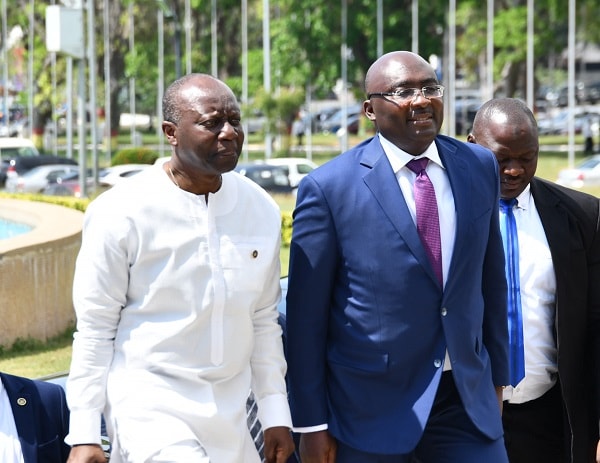
Govt to spend GH¢85.9 billion in 2020
The government intends to spend GH¢85.9 billion, representing 21.6 per cent of the country’s Gross Domestic Product (GDP), in the 2020 fiscal year.
The key drivers of the projected expenditure include the wage bill, which is projected at GH¢22.9 billion, interest payments of GH¢21.7 billion, goods and services for government operation at GH¢8.3 billion and capital expenditure of GH¢9.3 billion.
Other areas are the one-off financing of the 2020 presidential and parliamentary elections, funding of government flagship programmes and security.
The Minister of Finance, Mr Ken Ofori-Atta, gave the breakdown on Wednesday when he laid before Parliament the 2020 Budget and Economic Statement of the government.
Part of the expenditure will be directed at building infrastructure for the six newly created regions in the areas of administration blocks, educational and health infrastructure.
The 2020 expenditure estimates represent a 21.2 per cent increase over what the government projects will be spent by the end of this year.
Atmosphere in Parliament
Appearing in his signature all-white caftan, the Finance Minister exuded confidence and maintained a calm demeanour, even in the face of intermittent cheers from the Majority and jeers from the Minority, as he outlined the successes that the government had chalked up in the last three years.
The expected smooth presentation, with less heckling, was never to be because the Minority in the House disrupted proceedings any time they disagreed with the Finance Minister on some aspects of the budget.
The presentation, which started around 11:25 a.m., lasted about three hours and ended with the Minority displaying placards with the inscription ‘Bye Bye Budget’ to signal that it would be the last budget to be laid before the House by the Akufo-Addo adminstration.
The Majority, meanwhile, responded by singing the popular “Oye” choral song, which translates: ‘It’s all well’, as they stood firmly by the Finance Minister to indicate that the 2020 Budget was good news not just for them but Ghanaians in general.
Read also
No new taxes in 2020
'Gov't programmes have put GH¢12.2 billion in Ghanaians' pockets'
Full Text of 2020 Budget Statement by Finance Minister Ken Ofori-Atta
Revenue
Mr Ofori-Atta said total revenue and grants for 2020 was also projected to rise to GH¢67.1 billion, up from the projected outturn of GH¢54.6 billion for this year.
Domestic revenue, according to him, was estimated at GH¢65.8 billion, representing an annual growth of 22.5 per cent over what was expected at the end of this year.
Of domestic revenue, he said non-oil tax revenue would constitute about GH¢45 billion, reflecting the impact of expected improvement in tax compliance and reforms in revenue administration and the full-year revenue yield from the 2019 mid-year revenue measures.
Non-tax revenue (excluding oil), he said, was expected to reach GH¢8.5 billion.
![]()
Budget deficit
Based on the estimates for total revenue and grants and total expenditure, Mr Ofori-Atta pointed out that the 2020 fiscal operations would result in a cash deficit of GH¢18.9 billion, equivalent to 4.7 per cent of GDP.
That financing gap, he indicated, would be closed from both domestic and foreign sources.
Assurance not to overspend
In spite of the higher level of expenditure, projected to grow by 21.2 per cent in 2020, Mr Ofori-Atta gave an assurance that the government would not derail the economy by overspending in an election year.
“We shall work within the 2020 appropriated resource envelope and adhere to the Fiscal Responsibility Act to maintain fiscal discipline,” he said.
“We will do so not because we are complacent of our chances; no. We will do so because the nation needs it and we are not prepared to throw away all the sacrifices and gains the people and their government have made in the last three years,” he added.
![]()
Fiscal indiscipline
Economic management in election years in the Fourth Republic, with the exception of 2004, has been characterised by fiscal indiscipline, where governments have spent excessively way above revenue and what they budgeted for.
This has often led to wide fiscal deficits in almost all election years.
Mr Ofori-Atta said it was for that reason that the government passed the Fiscal Responsibility Act, 2018 (Act 982) that limits the fiscal deficit in any year to five per cent of GDP and the establishment of a Fiscal Council.
“It is due to our commitment to fiscal discipline that we have imposed upon ourselves a binding legislative constraint, with accompanying sanctions for me as the Finance Minister,” he said.
Tax structure reforms
Outlining some measures to boost revenue, Mr Ofori-Atta said the government would review the current tax legislation to strengthen the relevant laws and provide additional regulations and administrative guidelines for the taxation of electronic services.
He said it would also review and incorporate into legislation outstanding relevant actions, including requiring taxpayers to disclose their aggressive tax planning arrangements under what he described as “the relevant base erosion and profit shifting (BEPS) action points in existing legislation.
“The major revenue legislation will be reviewed to remove conflicts and fill in the gaps, and the relevant amendments submitted to Parliament for passage. The Revenue Administration Regulations and the updated Transfer Pricing Regulations will also be submitted for passage,” he stated.
To make revenue legislation more user friendly, he said, the Ghana Revenue Authority (GRA) would make abridged versions of the major revenue laws easily available to the public.
“We will also pursue non-tax revenue inflows associated with the operations of some telcos and state-owned enterprises (SOEs) to yield about 0.5 per cent of GDP in revenue inflows,” he said.
The Finance Minister said the personal income tax band would be adjusted and the necessary parliamentary approval sought to ensure that the 12 per cent increase in the minimum wage for 2020 was tax-exempt.
